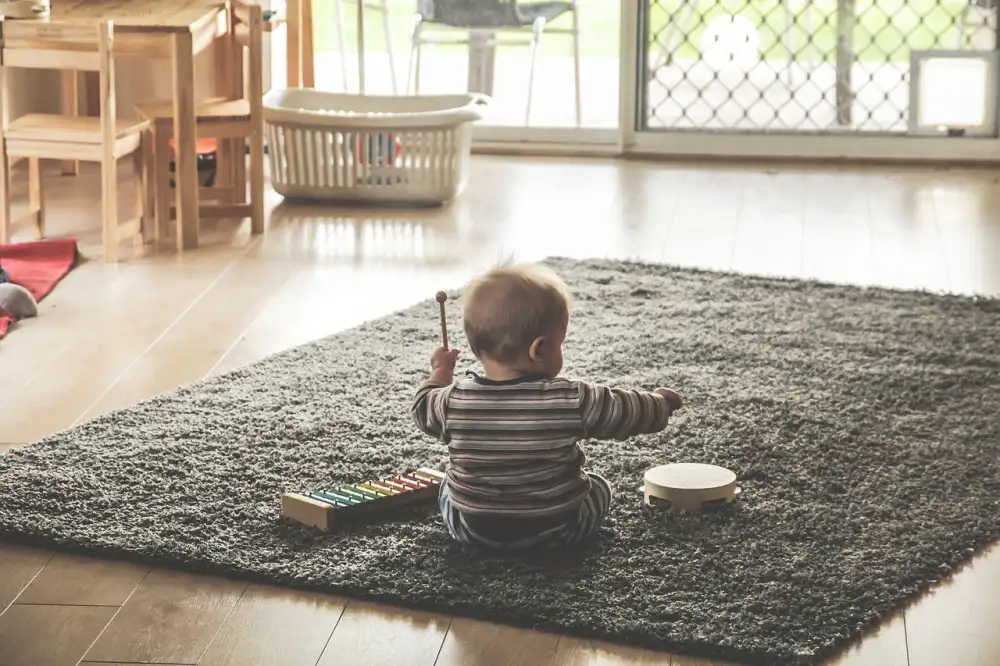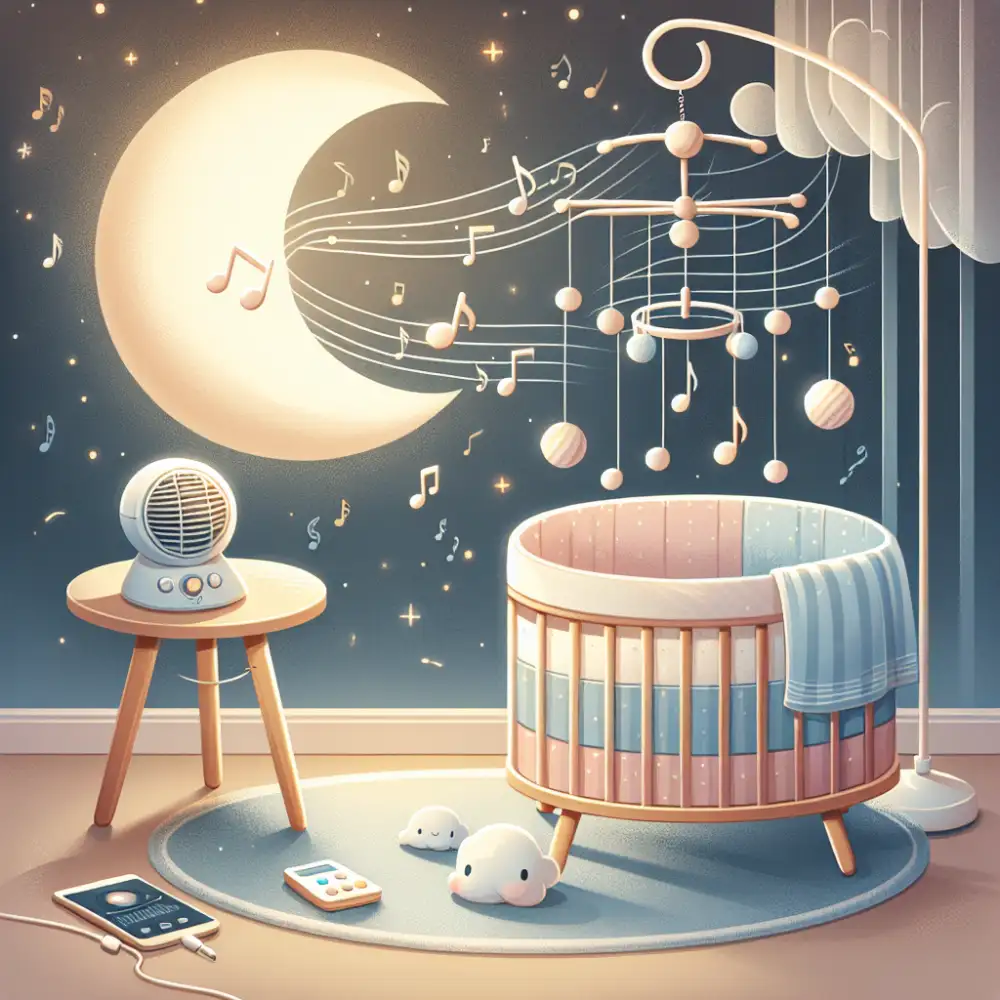Hush Little One: The Best Baby Music to Sleep Through the Night

Soothing sounds for babies
Music can be incredibly soothing for babies, often working wonders to calm their cries and lull them into a peaceful sleep. But with so many options available, it can be overwhelming for parents to choose the right kind of music.
The key is to understand what appeals to a baby's developing auditory system. Babies respond best to gentle, rhythmic sounds that mimic the comforting noises they heard in the womb, like their mother's heartbeat or the gentle whooshing of blood flow.
Classical music, with its complex melodies and harmonies, can be incredibly stimulating for babies' brains. However, opt for slower, more melodic pieces rather than fast, dramatic ones. Some popular choices include Mozart's "Eine kleine Nachtmusik," Bach's "Air on the G String," and Brahms' "Lullaby."
Lullabies, with their simple melodies and repetitive lyrics, are specifically designed to soothe babies to sleep. These traditional songs often feature gentle rocking rhythms and comforting themes of love and security.
Nature sounds can also be incredibly calming for babies. The gentle sounds of rain, ocean waves, or a babbling brook can create a serene and peaceful atmosphere, blocking out other noises that might disturb their sleep.
White noise is another popular choice for helping babies sleep. These consistent, soothing sounds, like the whirring of a fan or the static noise of an untuned radio, can help to mask other noises and create a calm and consistent auditory environment.
When using music to soothe your baby, keep the volume low and avoid any sudden or jarring sounds. You can play music through a speaker, but make sure it's placed a safe distance from your baby's crib.
Remember, every baby is different, and what works for one may not work for another. Experiment with different types of music and sounds to find what your baby responds to best. You might be surprised at the power of music to calm and soothe your little one.
| Feature | Classical Music | White Noise | Lullabies |
|---|---|---|---|
| Genre | Classical | Ambient | Folk |
| Tempo | Slow to Moderate | Constant | Slow |
| Lyrics | Typically None | None | Often present |
| Availability | Widely Available | Widely Available | Widely Available |
Benefits of music for sleep
Music can be a powerful tool to help soothe your baby to sleep. The gentle melodies and rhythms can create a calming and relaxing atmosphere, signaling to your baby that it's time to rest.

Listening to music releases dopamine, a mood-boosting hormone, in the brain. This can be especially helpful for babies who are fussy or irritable, as it can help to soothe and calm them. Music can also help to block out other noises and distractions that may be keeping your baby awake. This is especially helpful if you live in a noisy environment or if your baby is easily startled.
Familiar sounds and melodies can be incredibly comforting for babies, evoking feelings of security and safety. Playing calming music during bedtime routines can help babies associate those sounds with sleep, making the transition to sleep smoother over time.
White noise, nature sounds, or instrumental music without sudden changes in volume or tempo are excellent choices for sleep-inducing music. Consider playing music specifically designed for babies or toddlers, as these often incorporate soothing melodies and rhythms that are known to promote relaxation and sleep.
While music can be beneficial for sleep, it's essential to keep the volume low and avoid overstimulating your baby. Choose music that is calming and peaceful, and avoid anything that is too upbeat or jarring. You can play music for your baby during their bedtime routine or while they are falling asleep. If your baby seems to enjoy it, you can also leave the music playing softly in the background throughout the night.
Choosing the right music
When it comes to choosing music to help your baby sleep, there are a few things to keep in mind.
Simplicity is key. Look for music with a simple melody and a slow, steady beat. Complex arrangements or upbeat tempos can be overstimulating.
Nature sounds can be soothing. Many babies find the sounds of nature, such as rain, ocean waves, or birdsong, to be calming.
Classical music is a popular choice. Classical music, particularly the Baroque period, is known for its calming and sleep-inducing effects.
Lullabies are timeless. Lullabies are designed to soothe babies to sleep and can be a great option for bedtime.
Consider white noise. White noise is a steady, neutral sound that can help to block out other noises and create a more peaceful sleep environment.
Pay attention to your baby's cues. Every baby is different, so what works for one baby may not work for another.
Volume matters. Keep the music at a low volume. It should be audible but not distracting.
Ultimately, the best music to help your baby sleep is the music that they enjoy and that helps them to relax. Experiment with different types of music and sounds to find what works best for your little one.
Creating a sleep routine
Establishing a consistent sleep routine can significantly improve your baby's sleep patterns. Music can play a crucial role in this routine, signaling bedtime and creating a calming atmosphere.

Begin by selecting music specifically designed for babies. Look for calming melodies, gentle rhythms, and soft instrumentation like lullabies, classical music, or nature sounds. The goal is to create a soothing auditory experience that helps your baby relax.
Incorporate this music into your nightly routine. Start playing it softly as you dim the lights and engage in calming activities like a warm bath or a gentle massage. This consistent pairing of music with bedtime cues will help your baby associate the music with sleep.
Maintain a regular schedule for playing the music. Consistency is key when establishing routines for babies. Aim to start and stop the music at approximately the same time each night. This predictability helps set their internal clock, making it easier for them to fall asleep and stay asleep.
Keep the volume low and soothing. The music should be in the background, creating a peaceful ambiance without being overly stimulating. Avoid upbeat or loud music, as this can have the opposite effect and make it harder for your baby to fall asleep.
Consider using a white noise machine or app in conjunction with the music. White noise can help mask other sounds that might disturb your baby's sleep. You can play white noise continuously throughout the night, even after the music has stopped.
Remember that every baby is different, and what works for one may not work for another. Be patient and experiment with different types of music and routines to find what soothes your baby best.
Popular baby sleep music
Soothing melodies and white noise can work wonders for sending your little one off to dreamland. But with so many options available, choosing the right baby sleep music can feel overwhelming. Don't worry, we've got you covered!
Classical Music
Classical music, known for its complex melodies and calming harmonies, has been a go-to for parents for generations. Look for pieces specifically designed for babies, often featuring slower tempos and simplified arrangements. Some popular choices include Brahms' Lullaby, Mozart's Eine kleine Nachtmusik, and Debussy's Clair de Lune.
Nature Sounds
The gentle sounds of nature can be incredibly soothing for babies. Think rain falling, ocean waves crashing, or a babbling brook. These sounds can help to block out other noises and create a peaceful atmosphere. You can find a wide variety of nature sound albums and apps specifically designed for babies.
Lullabies
Traditional lullabies have been sung to babies for centuries for a reason: they work! The simple melodies and repetitive lyrics are naturally calming. Plus, singing lullabies to your baby can be a wonderful bonding experience. Don't worry if you don't have the best singing voice - your baby won't mind!
White Noise


White noise is a steady, consistent sound that can help to mask other noises and promote relaxation. Popular examples of white noise include the sound of a fan, a vacuum cleaner, or static noise. You can find white noise machines, apps, and even stuffed animals that play white noise.
Things to Keep in Mind
When choosing baby sleep music, opt for calming melodies and avoid anything too upbeat or stimulating. Keep the volume low - you want it to be soothing, not overwhelming. And remember, every baby is different. What works for one baby may not work for another, so be prepared to experiment until you find what your little one responds to best.
Using music safely
When using music to soothe your baby to sleep, it's essential to prioritize their safety and well-being. Here's what you need to keep in mind:
Volume Control is Crucial: Babies' ears are much more sensitive than ours. Always keep the volume low, resembling a gentle whisper or the sound of rain. It's best to err on the side of caution and avoid any loud or jarring noises.
Choose Calm and Melodious Tunes: Opt for music that is specifically designed for babies or has a calming and melodic nature. Classical music, lullabies, and nature sounds are popular choices. Avoid music with a fast tempo, heavy bass, or sudden changes in volume.
Positioning is Key: Never place speakers or devices directly next to your baby's head or in their crib. The sound waves can be too intense and potentially harm their developing ears. Instead, position the music source at a safe distance, ensuring a gentle and diffused sound.
Create a Safe Sleep Environment: Music should complement, not replace, a safe sleep environment. Ensure your baby's sleep space is free from hazards, such as loose blankets, pillows, or toys. Follow safe sleep guidelines recommended by pediatricians and health organizations.
Observe Your Baby's Cues: Every baby is different, and what works for one may not work for another. Pay attention to your baby's cues. If they seem agitated, overstimulated, or have trouble sleeping, it's best to turn off the music or try a different sound.
Moderate Use is Key: While music can be a helpful sleep aid, it's essential to use it in moderation. Avoid having music playing constantly throughout the night, as this can interfere with your baby's natural sleep cycles.
Consult Your Pediatrician: If you have any concerns about your baby's hearing, sleep habits, or the use of music, don't hesitate to consult your pediatrician. They can provide personalized guidance and address any specific questions you may have.

When to see a doctor
While music can be a helpful tool to soothe your baby to sleep, there are times when it's important to seek medical advice. If your baby is experiencing any of the following, consult your pediatrician:
Difficulty sleeping despite using music and other sleep aids consistently
Sudden changes in sleep patterns
Unusual fussiness or irritability during bedtime
Signs of discomfort or pain while listening to music
Any concerns about your baby's hearing or development
Remember, every baby is different, and what works for one may not work for another. Trust your instincts and seek professional guidance if you have any concerns about your baby's sleep or overall well-being.
Published: 21. 06. 2024
Category: lifestyle



